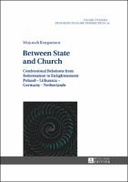Explore

The different theoretical notions and practices of the relations between the state and religious communities in early modern Europe constitute one of the most interesting problems in historiography. Moving away from a simple «toleration» versus «non-toleration» dichotomy, the author sets out to analyse the inter-confessional relations in selected European territories in a «longue duree» perspective, between Reformation and Enlightenment. Outlining the relations between the state and the different Churches (confessions) in the Polish-Lithuanian Commonwealth, the Holy Roman Empire of Germany, and the Northern Netherlands serves to highlight the specificity of Northern Netherlands serves to highlight the specificity of «free» (non-absolutist) composite states, where the particularly complex process of defining the raison d’etat determined the level of religious toleration that was politically feasible and socially acceptable.
This book is included in DOAB.
Why read this book? Have your say.
You must be logged in to comment.
Rights Information
Are you the author or publisher of this work? If so, you can claim it as yours by registering as an Unglue.it rights holder.Downloads
This work has been downloaded 160 times via unglue.it ebook links.
- 160 - pdf (CC BY-NC-ND) at OAPEN Library.
Keywords
- Church
- Church-state relations
- Confessional
- Denominational relations
- Early modern history: c 1450/1500 to c 1700
- Enlightenment
- Germany
- History
- History: earliest times to present day
- Humanist and political theory
- Humanities
- Kriegseisen
- Lithuania
- Netherlands
- Poland
- Politics & government
- Protestant and Catholic reformers
- reform
- Reformation
- Relations
- Society & Social Sciences
- State
- thema EDItEUR::3 Time period qualifiers::3M c 1500 onwards to present day
- thema EDItEUR::J Society and Social Sciences::JP Politics and government
- thema EDItEUR::N History and Archaeology
Links
DOI: 10.3726/978-3-653-02375-6Editions

